

Activists in Office: Kurdish Politics and Protest in Turkey - Nicole F. Watts. Iraq and the Kurds: The High-Stakes Hydrocarbons Gambit. Middle East Report N°120 19 Apr 2012 The full report is also available in Kurdish.
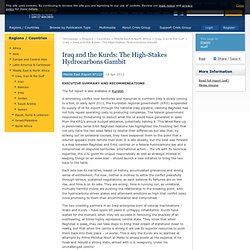
A simmering conflict over territories and resources in northern Iraq is slowly coming to a boil. In early April 2012, the Kurdistan regional government (KRG) suspended its supply of oil for export through the national Iraqi pipeline, claiming Baghdad had not fully repaid operating costs to producing companies. The federal government responded by threatening to deduct what the oil would have generated in sales from the KRG’s annual budget allocation, potentially halving it. This latest flare-up in perennially tense Erbil-Baghdad relations has highlighted the troubling fact that not only have the two sides failed to resolve their differences but also that, by striking out on unilateral courses, they have deepened them to the point that a solution appears more remote than ever.
Each side has its narrative, based on history, accumulated grievances and strong sense of entitlement. But the Kurds face a problem. Syrian Kurdish Cards. Upheaval in Syria has given Kurdish groups new opportunities to advance their nationalist agendas while serving as proxies for neighboring states.
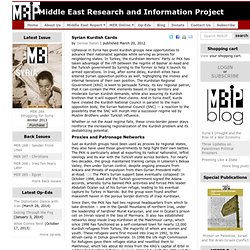
In Turkey, the Kurdistan Workers’ Party or PKK has taken advantage of the rift between the regime of Bashar al-Asad and the Turkish government by turning to the former to help it launch its armed operations. In Iraq, after some delay, Kurdish elites have entered Syrian opposition politics as well, highlighting the ironies and internal tensions of their own position. The Kurdistan Regional Government (KRG) is keen to persuade Turkey, its key regional patron, that it can contain the PKK elements based in Iraqi territory and moderate Syrian Kurdish demands, while also assuring its Kurdish brethren that it will support their claims. The Kurdish Question in Perspective. Are the Kurds Still Kingmakers in Iraq?
Since 2003 the Kurds have been considered kingmakers in Iraq, playing a key role in keeping the country together while negotiating Kurdish nationalist demands in Baghdad.
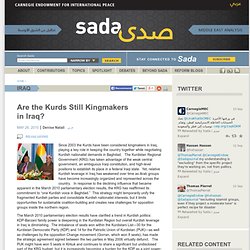
The Kurdistan Regional Government (KRG) has taken advantage of the weak central government, an ambiguous Iraqi constitution, and high-level positions to establish its place in a federal Iraqi state. Yet, relative Kurdish leverage in Iraq has weakened over time as Arab groups have become increasingly organized and represented across the country. In response to the declining influence that became apparent in the March 2010 parliamentary election results, the KRG has reaffirmed its commitment to “one Kurdish voice in Baghdad.” This strategy might temporarily unify the fragmented Kurdish parties and consolidate Kurdish nationalist interests, but it limits opportunities for sustainable coalition-building and creates new challenges for opposition groups inside the northern region. عربي. The Kurds and the State Evolving National Identity in Iraq, Turkey, and Iran by Denise Natali. Denise Natali Cloth $29.95s | 0-8156-3084-0 | 2005 A timely book that analyzes the formation of Kurdish national identity from the late Imperial period to the present.
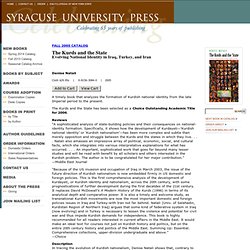
The Kurds and the State has been selected as a Choice Outstanding Academic Title for 2006. Reviews "A sophisticated analysis of state-building policies and their consequences on national-identity formation. Specifically, it shows how the development of Kurdayeti—‘Kurdish national identity’ or ‘Kurdish nationalism’—has been more complex and subtle than merely opposition and struggle between the Kurds and the states in which they live. . . . "Because of the US invasion and occupation of Iraq in March 2003, the issue of the future direction of Kurdish nationalism is now embedded firmly in US domestic and foreign policies.
With this book Natali makes a significant contribution to theoretical, empirical, and policy-based scholarship on the Middle East, the plight of the Kurds, ethnonationalism, and ethnopolitical conflict. The Kurdish Nationalist Movement. REVIEW ESSAY: Kurdish Scholarship Comes of Age. Michael M.
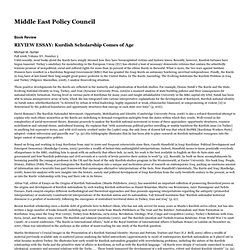
Gunter Fall 2008, Volume XV, Number 3 Until recently, most books about the Kurds have simply stressed how they have beenexploited victims and historic losers. Recently, however, Kurdish fortunes have begun toascend. Turkey’s candidacy for membership in the European Union (EU) has elicited a host of necessary democratic reforms that contain the admittedly tenuous promise of newpolitical, social and cultural rights for more than 50 percent of the ethnic Kurds in theworld.
These positive developments for the Kurds are reflected in the maturity and sophistication of Kurdish studies. David Romano’s The Kurdish Nationalist Movement: Opportunity, Mobilization and Identity (Cambridge University Press, 2006) is also a refined theoretical attempt to explain why such ethnic minorities as the Kurds are mobilizing to demand recognition andrights from the states within which they reside.
Asa Lundgren’s The Unwelcome Neighbour: Turkey’s Kurdish Policy (I. Faleh A. (I. Ahmadzadeh.